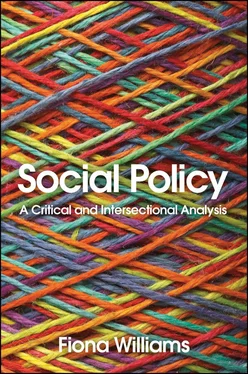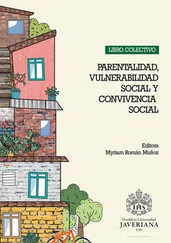While this marginalization is specific to both race and racism, where it is most marked, there are corresponding trends with other critiques. Far-reaching as they were, the earlier feminist analyses lost their ‘bite’ in mainstream social policy over subsequent decades (Williams 2016). No surprise, then, that in a review of the discipline Ann Orloff comments that, while the debates between feminists and mainstream scholars in comparative social policy have been productive, ‘yet the mainstream still resists the deeper implications of feminist work, and has difficulties assimilating concepts of care, gendered power, dependency and interdependency’ (Orloff 2009: 317; emphasis added). More recently and more specifically, Mary Daly and Emanuele Ferragina (2018) note the lack of integration of comparative family policies research into comparative studies of the welfare state and of austerity. Without this, they argue, not only are particular struggles around equality lost from analysis, but so are the connections of the shifts in social and cultural values and the ways family policies reinforce measures such as targeting, fiscalization or workfare. Set this against a broader political context, in which the gender pay gap, gender violence, everyday sexism, reproductive justice, and (more recently) inadequate recognition of paid and unpaid care work are high on the agenda of feminist organizations such as the Fawcett Society, Southall Black Sisters and Sisters Uncut (and see Campbell 2013; Olufemi 2020).
Other new perspectives emerging from struggles and research around disability, sexuality, migration, childhood and age also find themselves in specialist silos, obscuring their radical implications for social policy. The issue of the environment and climate change has been pushing hard to get on to the social policy agenda over the past two decades (Fitzpatrick and Cahill 2002; Fitzpatrick 2011, 2014; Snell and Haq 2014; Gough 2017; O’Neill et al. 2018). It has recently been given momentum by the arguments of Fitzpatrick (2014) and Gough (2017): that there is interdependence between social policies to improve the social infrastructure and the need to achieve sustainability. Social policy solutions are needed to ensure just adaption and mitigation policies, and social policy provision has itself to be delivered in a sustainable manner.
This complexity of continuity and change is reflected in the world outside of academic social policy. The context of neoliberalism and austerity politics, racialization and dehumanization of border practices, care crises and ecological disasters – including the 2020 pandemic – feels overwhelming. Yet recent decades have seen not only the impact of global social movements that I mentioned earlier but also a resurgence of local feminist and anti-racist activism, eco-activism and anti-austerity campaigns – the last often spearheaded by disability organizations. Alongside these, innovative democratically run decentralized initiatives have been established in communities ‘discarded by the market and disregarded by the state’, where people ‘are already doing economics differently’ (Chakrabortty 2018). These include new cooperative schemes, new unions, new forms of municipalism and community development, healthy cities, social enterprises, new models of co-production and service delivery, and new democratic modes such as citizens’ assemblies (Featherstone et al. 2020; Miller 2020). New global networks of ‘Fearless Cities’ are transforming cities through street-level democracy and feminist and anti-racist, pro-migrant solidarities (Barcelona en comú et al. 2019). Many experiments exist in generating zero growth and ecologically sustainable local economies in transition towns (Red Pepper 2020). Transnational movements have developed for indigenous peoples’ and migrants’ rights, against militarism, and for territorial justice, along with the remarkable international mobilization of school students’ strikes against climate change started in 2018. International campaigns for LGBTQI+ rights have achieved significant cultural recognition, albeit uneven and contested, that would not have seemed possible at the turn of the century (Weeks 2007; Abrahams 2019). In addition, in many areas, the Covid-19 pandemic revealed street-level actions of generosity, kindness, mutual aid and care (Solnit 2020).
While this resurgence signifies challenge and change, there is also a sense of intensified continuities – the ‘unfinished business’ of everyday and institutional racism, sexism, ableism and ageism finding consequential logics in different forms of inequalities, insecurities and child poverty, all of which were magnified by the pandemic crisis. The increased precarity of working conditions, combined with austerity cutbacks in services and benefits, disproportionately affects the wellbeing of black and minority ethnic women (WBG and Runnymede Trust 2017). A systematic account of ethnicity, race, discrimination and racism published in 2020 found that these were entrenched for all minority groups in all areas of society – education, employment, housing, health, criminal justice and policing, as well as politics, the arts, media and sport (Byrne et al. 2020). Even the Conservative government’s Racial Disparity Unit worried in 2018 that ‘there is still a way to go before we have a country that works for everyone regardless of their ethnicity’ (Cabinet Office 2018: 1).
These forms of inequality were reproduced in the disproportionate effects of the Covid-19 pandemic: in the UK, BAME men and women were over four times more likely to die than their white counterparts (ONS 2020a). The high numbers of deaths of care-home residents (ONS 2020b) underlined the low value given to both residents and workers in care homes and the creaking health and social care infrastructure. Disability organizations have been at the forefront of campaigns around welfare benefit cuts; at the same time they have also been the target of a big increase in hate crimes (Burch 2018). Transgender activists have made headway in challenging transphobia, yet trans and gender-diverse as well as LGBTQ people face significantly greater risk of unemployment, hate crime and homelessness, risks which are heightened for BAME trans groups (Bachmann and Gooch 2017; Hines 2013; Abrahams 2019).
New critical thinking that has been inspired by and inspires such activism also involves a double movement of continuity and change: introducing new ideas as well as interrogating and resituating ‘old’ concepts. In addressing the continuing forms of marginalization both on the ground and in social policy’s mainstream, I develop an analysis that is informed by contemporary thinking and activisms within and outside social policy and also connects to critical thinking in social policy that came out of social movements from the 1970s and 1980s. Thus, intersectionality emerged in the 1970s to make visible the struggles of women of colour whose experiences were reconstituted through the intersections race, gender, and class relations of power (Combahee River Collective [1977] 1995; Hull et al. 1982; Moraga and Anzaldúa 1983; Lewis and Parmar 1983; Crenshaw 1989). This re-emerged in the twenty-first century both as a reassertion and a reflection of the power of black feminist thinking and as ‘the most important theoretical contribution that women’s studies, in conjunction with related fields, has made so far’ (McCall 2005: 1771). It serves as a methodological and political concept to reflect the multiplicity of identities and forms of domination and subordination as well as the need to recognize the connections that link theory and method to political practice (McCall 2005; Cho et al. 2013; May 2015; Hill Collins and Bilge 2016; Carastathis 2016; Hancock 2016; Romero 2018; Nash 2019).
Читать дальше












